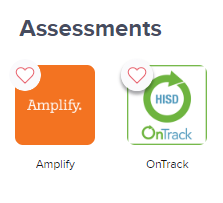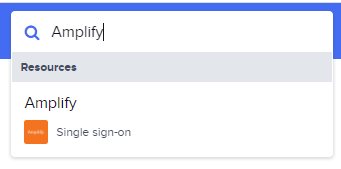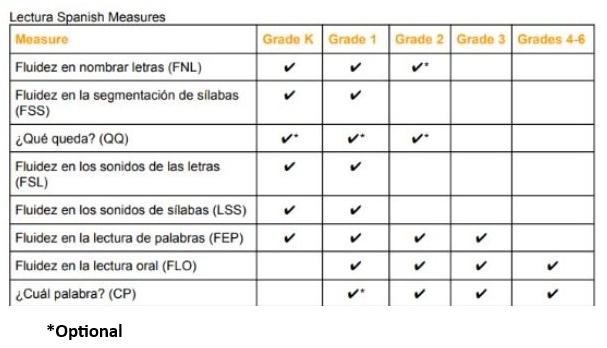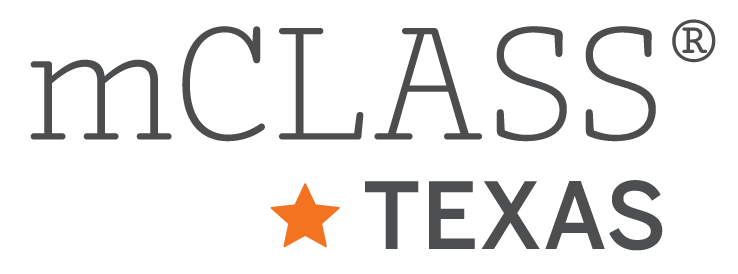- Houston Independent School District
- Interim Assessment
- mCLASS DIBELS/Lectura
Student Assessment
Page Navigation
mClass Info: DIBELS & Lectura
Getting Started
-
How do I login?
Login Steps
Teachers should have accounts set up in Clever.
- Locate the Amplify icon under Assessments

- Use the search box to find Amplify

*Only Principals, Assistant Principals and Teachers have access to the Amplify platformIf Amplify does not appear, contact servicedesk@houstonisd.org
-
Self-Paced Online Modules
Use the link below for directions to register for an mCLASS DIBELS or Lectura online module.
Support & FAQ
-
Popular CTC Resources
Below are links to our CMS:
mCLASS DIBELS-Lectura - All PowerPoints, Training Recordings, Links to Forms
mCLASS DIBELS-Lectura - Assessment Guidance Document
-
FAQ
Frequently Asked Questions
mCLASS DIBELS
-
What is mCLASS DIBELS 8th Edition?
Employing innovative mobile technology, mCLASS with DIBELS® 8th Edition software is designed to make assessment more accurate and effective, helping you analyze assessment results and shape instruction for kindergarten through sixth-grade students. Developed through a unique partnership with the University of Oregon and Amplify, mCLASS with DIBELS 8th Edition provides Benchmark assessments, Progress Monitoring, reinforcement activities, specialized grouping, and instantaneous access to scores. The Benchmark assessments provide quick and accurate identification of students in need of reading support and intervention. The Progress Monitoring tasks are used to track performance on the skills in which students require additional support.
mCLASS with DIBELS 8th Edition introduces several changes, including new features such as gating/discontinue rules, a new DIBELS measure (Word Reading Fluency), and modern measurement approaches to scoring, as well as the retirement of two existing measures (First Sound Fluency and Retell Fluency).
mCLASS with DIBELS 8th Edition:
• Supports efficient administration of measures
• Performs calculations and reduces paperwork
• Turns assessment results into clear, meaningful reports
• Keeps a permanent record of assessment results
mCLASS with DIBELS 8th Edition contains four components:
• Software: Includes all assessment forms, instructions, and practice questions for each grade level and assessment period.
• Kit: Includes the Administration Guide and student materials.
• Syncing: The process by which the assessment information from the mobile device is matched to the database maintained through learning.amplify.com.
• Reports: Web-based student and class reports provided online to aid in defining instructional changes.
-
Administration and Resources
Starting a Benchmark Assessment
Learn how to start a Benchmark Assessment for DIBELS in mCLASS.
Administration and Scoring Practice
Learn how to score each Benchmark assessment measure, then practice scoring a sample student assessment. Score each student's response using your device, then check your results against the answer key. For additional practice, select the leveled scoring practice video at the difficulty level you feel is appropriate for your current skill set.
Access the DIBELS administration materials for Benchmark assessments and progress monitoring for each grade level.
-
Administration and Scoring
mCLASS with DIBELS 8th Edition consists of seven measures.
• Phonemic Segmentation Fluency (PSF)
• First Sound Isolation (FSI) - Optional
• Maze
The measures administered during an assessment depend on the student's grade level.
The DIBELS Composite Score is a combination of DIBELS scores that provides an overall estimate of a student’s early literacy skills and/or reading proficiency, when taking all applicable component skills into account simultaneously.
DIBELS 8th Edition benchmark goals are empirically derived, criterion-referenced target scores that represent adequate reading skill for a particular grade and time of year.
Gating Rules for Benchmark Assessment
For DIBELS 8th Edition we have identified certain key literacy skills for each grade level and time of year, and determined that students who demonstrate mastery of these skills are likely to be on track for achieving future literacy goals.
-
Special Populations Considerations
Approved Accommodations
The DIBELS 8th Edition measures are designed to be used unmodified with all students. They have been validated with thousands of students using the DIBELS 8th Edition standardized procedures. Interpretation of student scores is only informative when students have been assessed in this standardized way.
In a very small number of cases, however, several accommodations are approved. These accommodations should only be used in situations where they are necessary to obtain an accurate score for a student. In other words, accommodations should only be used if there is evidence that without them, the assessment would be measuring something other than the intended reading-related skill. For example, if a student is hard of hearing and without an accommodation the student would not be able to hear the testing directions, then that would result in the test measuring the student’s hearing abilities rather than reading skills. An accommodation would be appropriate in this case.
DIBELS 8th Edition-approved assessment accommodations involve minor changes to assessment procedures that are unlikely to change the meaning of the results and have been approved either by DIBELS developers or assessment professionals. They should be used only when:
• An accurate score is unlikely to be obtained without the accommodation; and/or
• Specified in a student’s 504 plan or Individualized Education Plan (IEP).
Unapproved Accommodations
Anything an assessor does that is not listed in the standardized scoring and administration and is not an approved accommodation falls under the category of a modification. Any modification made to the standardized directions, timing or scoring rules renders results that are likely to be meaningfully different than they would have been without the modification. Examples of unapproved accommodations and modifications include: (a) extending the time on a DIBELS probe, (b) repeating practice items, (c) providing different or extra models of the task, (d) adding to or changing administration directions, and (e) offering unapproved prompts and feedback. When unapproved accommodations or modifications are used, scores are not valid in these cases and should not be interpreted in relation to associated benchmark goals and norms.
It is important to recognize that there are some students for whom mCLASS is not an appropriate assessment. Students for whom this is true include those:
• With limited verbal language skills,
• With fluency-based speech disorders or oral apraxia, and/or
• For English assessments - Students for whom reading in English is not an instructional goal (e.g., students learning to read exclusively in a language other than English).
In these cases, other assessments and curricular tools (e.g., end-of-unit tests, individualized progress monitoring materials, other-language reading assessments) are best suited to screening students and monitoring student progress toward goals.
mCLASS Lectura
-
What is mCLASS Lectura?
Built from the ground up through a partnership with the Center on Teaching & Learning at the University of Oregon, mCLASS Lectura is Amplify’s new Spanish literacy universal screening, dyslexia screening, and progress monitoring (PM) assessment system for kindergarten through sixth grade. mCLASS Lectura was designed with consideration of how Spanish literacy skills are acquired and developed, with a goal of providing educators with valid and reliable measures of Spanish reading development to inform instructional decisions.
A major concern for educators of Spanish-speaking students in the U.S. is that many available Spanish assessment systems are translations of existing English assessments and may not take into account linguistic and cultural considerations relevant to Spanish-speakers. The mCLASS Lectura assessment system was developed in Spanish to address this concern by including measures that explicitly account for phonological, syllabic, morphological, and syntactical features that are specific to Spanish and to incorporate theories of cross-linguistic transfer about how students’ knowledge and skills in their native language can be used to support the development of similar skills in their second language (Cummins, 1979; Proctor et al., 2010). mCLASS Lectura was developed to assess Spanish literacy skills for all learners: native speakers of Spanish as well as those learning to read Spanish as a second language.
The mCLASS Lectura assessment system consists of subtests in the critical skills of Spanish literacy development. The individual subtest results help educators understand (a) skills that can be leveraged to support native Spanish-speaking students as they learn to read in English and (b) targeted areas to support all students who are learning to read in Spanish, with a goal of bilingualism and biliteracy.
mCLASS Lectura was developed to assess Spanish literacy skills for all learners: native speakers of Spanish as well as those learning to read Spanish as a second language. The assessment consists of subtests in the critical skills of Spanish literacy development. The individual subtest results help educators understand:
• The skills that can be leveraged to support native Spanish-speaking students as they learn to read in English.
• The targeted areas to support all students who are learning to read in Spanish, with a goal of bilingualism and biliteracy.
mCLASS Lectura employs the innovative mobile technology of mCLASS software, which is designed to make assessment more accurate and effective, helping you analyze assessment results and shape instruction for kindergarten through sixth-grade students.
mCLASS Lectura:
• Supports efficient administration of measures
• Performs calculations and reduces paperwork
• Turns assessment results into clear, meaningful reports
• Keeps a permanent record of assessment results
mCLASS Lectura contains four components:
• Software: Includes all assessment forms, instructions, and practice questions for each grade level and assessment period.
• Kit: Includes the Administration Guide and student materials.
• Syncing: The process by which the assessment information from the mobile device is matched to the mCLASS database.
• Reports: Web-based class and student reports provided online to aid in defining instructional changes.
-
Required Measures

-
Administration and Resources
Starting a Benchmark Assessment
Learn how to start a Benchmark Assessmetn for Lectura in mCLASS.
Administration and Scoring Practice
Learn how to score each Benchmark assessment measure, then practice scoring a sample student assessment. Score each student’s response using your device, then check your results against the answer key. For additional practice, select the leveled scoring practice video at the level of difficulty you feel is appropriate for your current skill set.
Access the mClass Lectura administration materials for Benchmark assessments and progress monitoring for each grade level.
-
Administration and Scoring
mCLASS Lectura Measures
mCLASS Lectura consists of nine measures (two of which are optional).
• Fluidez en nombrar letras (FNL)
• Fluidez en la segmentación de sílabas (FSS)
• Fluidez en los sonidos de las letras (FSL)
• Fluidez en los sonidos de las letras K-Inicio (FSL K-Inicio) (Optional)
• Fluidez en los sonidos de sílabas (LSS)
• Fluidez en la lectura de palabras (FEP)
• Fluidez en la lectura oral (FLO)
Measures and Descriptions
mCLASS Lectura uses nine measures designed to assess a variety of reading skills for Spanish-speaking or emergent bilingual students. The measures administered during mCLASS Lectura assessment depend on the student's grade level.
The mCLASS Lectura Composite Score is a combination of measure scores that provides an overall estimate of a student’s early Spanish literacy skills and/or reading proficiency, when taking all applicable component skills into account simultaneously.
Gating Rules for Benchmark Assessment
Like DIBELS® 8th Edition, mCLASS Lectura includes gating rules designed to save time and prevent unnecessary testing by giving educators the option to stop the administration of benchmark assessments based on student performance. The subsequent required measures are marked as discontinued, but halting assessment is optional, as you are not prevented from continuing if you believe that further assessment is necessary.
-
Special Populations Considerations
Approved Accommodations
Similar to mCLASS DIBELS® 8th Edition, the mCLASS Lectura subtests are designed to be administered without modifications to all students (University of Oregon, 2020). They have been validated with thousands of students using the Lectura standardized administration and scoring procedures. Interpretation of student scores is only informative when students have been assessed in this standardized way.
In a very small number of cases, however, several accommodations are approved. These accommodations should only be used in situations where they are necessary to obtain an accurate score for a student. In other words, accommodations should only be used if there is evidence that without them the assessment would be measuring something other than the intended literacy-related skill (University of Oregon, 2020). For example, if a student is hard of hearing and without an accommodation they would not be able to hear the administration directions (and, consequently, would not be able to understand the task), then their resulting performance would be more reflective of their hearing abilities rather than their literacy skills; an accommodation would be appropriate in this case. Approved assessment accommodations for mCLASS Lectura involve minor changes to assessment procedures that are unlikely to change the meaning of the results and have been approved either by mCLASS Lectura developers or assessment professionals (University of Oregon, 2020). They should be used only when:
• An accurate score is unlikely to be obtained without the accommodation; and/or
• The accommodation is specified in a student’s 504 plan or Individualized Education Plan (IEP).
Unapproved Accommodations
Anything an examiner does that is not listed in the standardized scoring and administration and is not an approved accommodation falls under the category of a modification. Any modification made to the standardized directions, timing, or scoring rules renders results that are likely to be meaningfully different than they would have been without the modification. Examples of unapproved accommodations and modifications include: (a) extending the time on mCLASS Lectura subtests, (b) repeating practice items, (c) providing different or extra models of the task, (d) adding to or changing administration directions, and/or (e) offering unapproved prompts and feedback (University of Oregon, 2020).
Scores obtained using unapproved accommodations or modifications are not valid and should not be interpreted in relation to mCLASS Lectura benchmark goals and norms.
It is important to recognize that there are some students for whom mCLASS Lectura is not an appropriate assessment. Students for whom this is true include those:
• With limited verbal language skills, and/or
• With fluency-based speech disorders or oral apraxia.
In these cases, other assessments and curricular tools (e.g., end-of-unit tests, individualized progress monitoring materials) are best suited to screening students and monitoring student progress toward goals.


